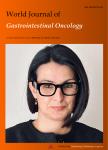Molecular classifications of gastric cancers: Novel insights and possible future applications
Molecular classifications of gastric cancers: Novel insights and possible future applications作者机构:Department of Oncology University and General Hospital Medical Oncology University Hospital Medical Oncology National Cancer InstituteIRCCS Department of Oncology University Hospital
出 版 物:《World Journal of Gastrointestinal Oncology》 (世界胃肠肿瘤学杂志(英文版)(电子版))
年 卷 期:2017年第9卷第5期
页 面:194-208页
核心收录:
学科分类:1002[医学-临床医学] 100214[医学-肿瘤学] 10[医学]
主 题:Molecular biology Immunotherapy Gastric cancer Classification Targeted therapy
摘 要:Despite some notable advances in the systemic management of gastric cancer(GC), the prognosis of patients with advanced disease remains overall poor and their chance of cure is anecdotic. In a molecularly selected population, a median overall survival of 13.8 mo has been reached with the use of human epidermal growth factor 2(HER2) inhibitors in combination with chemotherapy, which has soon after become the standard of care for patients with HER2-overexpressing GC. Moreover, oncologists have recognized the clinical utility of conceiving cancers as a collection of different molecularlydriven entities rather than a single disease. Several molecular drivers have been identified as having crucial roles in other tumors and new molecular classifications have been recently proposed for gastric cancer as well. Not only these classifications allow the identification of different tumor subtypes with unique features, but also they serve as springboard for the development of different therapeutic strategies. Hopefully, the application of standard systemic chemotherapy, specifictargeted agents, immunotherapy or even surgery in specific cancer subgroups will help maximizing treatment outcomes and will avoid treating patients with minimal chance to respond, therefore diluting the average benefit. In this review, we aim at elucidating the aspects of GC molecular subtypes, and the possible future applications of such molecular analyses.



